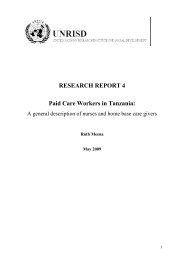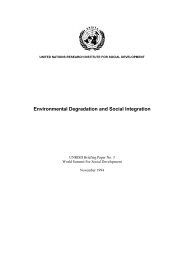Women's Employment - United Nations Research Institute for Social ...
Women's Employment - United Nations Research Institute for Social ...
Women's Employment - United Nations Research Institute for Social ...
You also want an ePaper? Increase the reach of your titles
YUMPU automatically turns print PDFs into web optimized ePapers that Google loves.
Women’s employment in the textile manufacturing sectors of Bangladesh and Morocco<br />
employment is never guaranteed. Almost half of the women workers<br />
of our survey had already worked in another factory and some of<br />
them are in their fourth or fifth factory. The reasons <strong>for</strong> “job hopping”<br />
are made apparent in the interview excerpt below:<br />
The first time I got work it was with X firm which the vocational<br />
training centre had mentioned to me. But the working conditions<br />
were difficult and the wages low, so I left it pretty quickly. I was<br />
without work <strong>for</strong> several months and then I got a job with another<br />
firm at Kénitra. I stayed there three years. But I left it because the<br />
exploitation was too great and the wages too little. Low wages are<br />
typical in Kénitra. As my father died, I had to find a way of increasing<br />
my income. So I thought of going to Salé (30 kms from Kénitra) and<br />
to look <strong>for</strong> work there so I could help my family. I was sure that the<br />
working conditions in Rabat or Salé would be better than those at<br />
Kénitra. My family wasn’t against the idea. I left <strong>for</strong> Salé and there<br />
I presented myself at a company which I had heard was the best in<br />
that industrial district. The owners were <strong>for</strong>eigners: they were known<br />
<strong>for</strong> their sympathy towards the workers and the wages were the best.<br />
They paid the statutory minimum wage (SMIG). I was accepted when<br />
they saw I had a dressmaking diploma and that I had worked with<br />
other firms. I liked the work in this factory but the problem was my<br />
supervisor: she was a very authoritarian woman who used to insult<br />
us, especially me. She was always against me. I left the firm because<br />
of this cheffa, even though I was better paid than where I am now. I<br />
got 7.30 dirham an hour, but I left. I went to this factory when I saw<br />
the girls lining up outside to ask <strong>for</strong> work. I was soon taken on,<br />
especially after I had done a practical test on the sewing machine.<br />
(Touria, worker in a garment factory)<br />
For the employees who had already worked in another firm,<br />
the duration of the previous job varied from a few months to more<br />
than four years. More than half the women workers interviewed had<br />
stayed at their previous place of employment less than two years.<br />
Among the reasons given <strong>for</strong> leaving the previous job were: the low<br />
wages, the working conditions, authoritarian work practices and<br />
personal factors.<br />
Instability of employment is not always a disadvantage to<br />
women workers. They can use the existing system to accumulate<br />
know-how, and when their jobs are in danger they too threaten to<br />
leave and go and sell their experience elsewhere. The women workers<br />
thus play on competition between the factories hoping to better their<br />
position. The factory heads also attempt to use this accumulation of<br />
skills to their own advantage:<br />
78
















